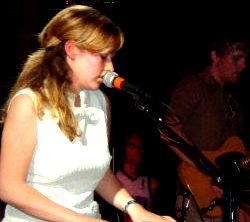 |
 |
 |
 |
| ::Interviews:: |
| review & interview content, as well as web site graphics & design, copywrite 2003-2004 Euphonia Online. use of materials granted only with reasonable purposes. |
 |
| interviewed by robby sumner |
 |
| Interview with Greta June 4th, 2006 |
Bob Morris - Vocals, Guitar Greta Salpeter - Vocals, Piano, Guitar Chris Faller - Bass, Vocals Darren Wilson - Drums, Vocals |
| E: For the past couple weeks, you guys have been playing dates in Europe in preparation for the release of your new album, Like Vines. So tell me, honestly... has the confidence you have in your art allowed you to have ever predicted one day being here, doing all this?
Greta: When we first started, Bob and Darren and Chris had all been in numerous bands before, and it was my first time being in a band. I'd always been writing songs on my own, and I've been playing piano since I was really young. We started playing together, and I just kind of thought we were all in it for fun, and none of us talked about getting signed or what it would be like to do it professionally or anything. So really, none of us expected it, and none of us expected a somewhat-successful outcome--even the small successes we'd had so far. So when Pete [Wentz from Fall Out Boy] sent us an e-mail, and he was like, "What are you guys doing? I kind of want to sign you," I'm just terribly confused, you know? *Laughs* I'm just, newly, seventeen years old, a junior in High School, deciding where I'm going to go to college, and we get this e-mail saying we can be a signed band working professionally, doing something we love. We were all just kind of confused! I know Bob had more of a set idea, that he thought we were doing something kind of unique and kind of interesting, and I was just kind of in it for fun, but after what we were doing was recognized from an outside source, then I realized, yeah, maybe we might have something kind of unique.... maybe we're not doing what everybody else is doing. E: How much hard work is it to go on tours like the one you're on now? Is it a bunch of fun sight-seeing, music-playing fun? Or is there a high level of struggle and work? Greta: The Fall Out Boy tour was the hardest test of our physical and emotional limits any of us had ever had. *Laughs* Because, basically, we check in at the show at twelve, there's soundchecks, load-in, all sorts of things... you play a show, wait around until two in the morning when all the merchandise is counted, and then, in the middle of the night, drive five to twelve hours to the next show. So we got very, very little sleep, and we had no days off on the tour. We had just finished a month of recording for our album, so we were all just dead tired, and it was our first tour and it was something so huge... it was just such a huge responsibility and such a huge blessing at the same time. So it was definitely really hard, but it was totally worth it. We made really good friends with all the other bands, and we got to see a lot of great places on the drive... we didn't really explore at all, because there was no time to, but in the U.K. it was way more fun. It was the first time we've ever had a bus, so we actually slept at night. *Laughs* Which meant that during the day, when we wanted to go out and explore, we were well-rested and more in the mindset to do so. Particularly in Scotland... Bob and I went for, like, a ten-mile hike up to this huge hill in the middle of Edinburgh and looked at all the castles and took pictures of the views... that was really, really cool, and I hope we can do stuff like that more often. E: Only another week until Like Vines, your second release within a short amount of time, hits the shelves... have you given thought to how this specific album's success will affect the rest of your career? Greta: Well one thing... this is the second album in a little bit over a year. We haven't been a band for more than a year and a half. The one thing about success... the way that I kind of look at it and perceive it is that, as a musician, you have to do what comes honestly to you. You can't write for a certain audience, because audiences constantly change. You have to do what is natural to you and what you like, and then you put it out there and it's just completely up to circumstance. So the way I look at it, hopefully we'll succeed, but we might fail, so we just need to do what we love and not take it too seriously. Maybe this is the album that will determine our success or not... but, I mean, commercial success is totally different than artistic success, and for us this is an artistic success and a huge step in the right direction. So even if, commercially, it doesn't do well, as a step of success for what our band considers success, it's definitely a move forward. E: You guys are on the roster at Fueled By Ramen/Decaydance, which has recently generated a huge amount of attention with bands like Fall Out Boy, The Academy Is, and Panic! at the Disco tearing up the charts with a style that's somewhat different from your own. Surrounded by all that, do you ever feel any pressure to be the "next" of something? Greta: Not really. I mean, I don't see many simularities musically between us and Panic or between us and The Academy Is, and I think that the only people who really make those assumptions of similarities do it because we're signed to the same record label, and that's really the only thing tying us all together. But we definitely don't feel pressure to sell as many albums as Panic is, because that's probably not realistic, and we realize it's probably not realistic. We're in it now more for fun and for creativity than we are for competing with the other bands on our label. E: As you interact with other bands, both on your label and off, do you feel like the music industry's cutthroat reputation is justified? Or is there more of a community of bands working together toward the same goal? Greta: I think that labels are families. Generally, labels are always trying to help each other out. Like, if you like at Fueled By Ramen, there is a complete "piggyback" system--which is why Fall Out Boy took Panic out, and Panic took The Academy Is out, and The Academy Is took us out. Within a record label, there is a certain sense of community and a certain sense of effort to help pull each other up, because when one band is doing well, it brings more attention to the other bands, and everyone knows that. But I think when it comes to rivalry between labels, then it's much more intense and much more cutthroat. And I definitely see that aspect of it. E: How universal would you say your songs are? For example, would a 14-year-old girl in San Jose hear a Hush Sound song and be impacted the same way a 20-year-old guy in Chicago would? Greta: I think when a person writes a song, you can either write something that is going to be timeless and completely universal--a song like "Let It Be," for example--and that's a good kind of relation. That's the perfect example of a song where everyone can relate to it, because it's written so perfectly. But I think other songs that everyone can relate to are very difficult to find, and I guess that's every songwriter's quest, is writing something that will be around... an immortal song because so many people understand it. I think our songs are more routed towards people have good imaginations in terms of images, because there's definitely a visual aspect to our music. I think, other than that, most people should be able to relate to it, even though everything's written on a very personal level and on a very introspective level, I think that that's how most music is written, and most people can relate to the music. E: Have you gotten the chance to really witness the diversity of your fanbase? Greta: Honestly, I think we write music for anyone. I think it's the most flattering thing in the world when people's parents come up and say they love the album, and then when the kids I babysit for--who are six and seven years old--can be singing our song. I think that, generally, people who are our own age, plus or minus five years, will relate to it better than others, but when age groups on either side of the spectrum can appreciate it, it's just kind of a huge testament to the universalism of the songs. E: Thank you so much for taking the time to talk! Greta: Hey, no problem! Thank you! |